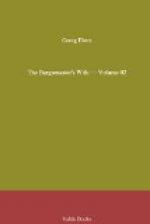While reading, Maria saw in imagination Jacoba’s pretty face, and the handsome, enthusiastic countenance of her bridegroom. She remembered their gay wedding, her brother-in-law’s impetuous friend, so lavishly endowed with every gift of nature, who had accompanied him to Holland to be his groomsman, and at parting had given her the rose which lay before her in the little casket. No voice had ever suited hers so well; she had never heard language so poetical from any other lips, never had eyes that sparkled like the young Thuringian noble’s looked into hers.
After the wedding Georg von Dornberg returned home and the young couple went to Haarlem. She had heard nothing from the young foreigner, and her sister and her husband were soon silenced forever. Like most of the inhabitants of Haarlem, they were put to death by the Spanish destroyers at the capture of the noble, hapless city. Nothing was left of her beloved sister except a faithful memory of her, and her betrothed bridegroom’s letters, which she now held in her hand.
They expressed love, the true, lofty love, that can speak with the tongues of angels and move mountains. There lay her husband’s letter. Miserable scrawl! She shrank from opening it again, as she laid the beloved mementoes back into the box, yet her breast heaved as she thought of Peter. She knew too that she loved him, and that his faithful heart belonged to her. But she was not satisfied, she was not happy, for he showed her only tender affection or paternal kindness, and she wished to be loved differently. The pupil, nay the friend of the learned Groot, the young wife who had grown up in the society of highly educated men, the enthusiastic patriot, felt that she was capable of being more, far more to her husband, than he asked. She had never expected gushing emotions or high-strung phrases from the grave man engaged in vigorous action, but believed he would understand all the lofty, noble sentiments stirring in her soul, permit her to share his struggles and become the partner of his thoughts and feelings. The meagre letter received to-day again taught her that her anticipations were not realized.
He had been a faithful friend of her father, now numbered with the dead. Her brother-in-law too had attached himself, with all the enthusiasm of youth, to the older, fully-matured champion of liberty, Van der Werff. When he had spoken of Peter to Maria, it was always with expressions of the warmest admiration and love. Peter had come to Delft soon after her father’s death and the violent end of the young wedded pair, and when he expressed his sympathy and strove to comfort her, did so in strong, tender words, to which she could cling, as if to an anchor, in the misery of her heart. The valient citizen of Leyden came to Delft more and more frequently, and was always a guest at Doctor Groot’s house. When the men were engaged in consultation, Maria was permitted to fill their glasses and be present at their conferences. Words flew to and fro and often seemed to her neither clear nor wise; but what Van der Werff said was always sensible, and a child could understand his plain, vigorous speech. He appeared to the young girl like an oak-tree among swaying willows. She knew of many of his journeys, undertaken at the peril of his life, in the service of the Prince and his native land, and awaited their result with a throbbing heart.




